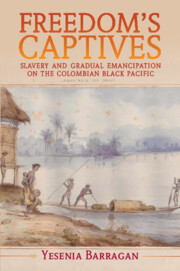‘Freedom’s Captives is a unique and elegantly written study of slavery, freedom, and unfreedom that creatively challenges assumptions to inform our understandings of Early Modern African-descended people in the Americas. The book will establish Barragan as a preeminent scholar on free womb laws and practices as they related to the abolition of slavery.’
Kevin Dawson - Associate Professor of History, University of California, Merced
‘With great insight, Yesenia Barragan introduces the concept of ‘free-womb captivity’ to parse the predicaments of Black autonomy in the aftermath of Colombia’s 1821 Free Womb Law. The resulting work is a brilliant analysis of the project of gradual abolition that prompts new ways to think comparatively about the Black Pacific and the Atlantic world. Freedom’s Captives sets a new standard for writing about the Spanish American abolitions of the mid-nineteenth-century.’
Celso Thomas Castilho - Vanderbilt University
‘Freedom’s Captives is a fascinating and important contribution to the study of slavery and abolition in Spanish America. From the perspective of the “Black Pacific” region of Colombia, one of slavery’s cores in South America, Barragan weaves together the histories of legal abolition in the new republic with remarkable traces of the lives of the enslaved and freed people in Chocó. The book powerfully illustrates crucial nuances in the process of Colombia’s gradual abolition, while integrating Spanish America in broader discussions on abolition in the Atlantic world.’
Marcela Echeverri - Yale University and author of Indian and Slave Royalists in the Age of Revolution
‘Yesenia Barragan’s captivating book takes us to Colombia’s Chocó in the first half of the nineteenth century and masterfully exposes the tensions of gradual emancipation. It honors the lives of those whose freedom was delayed and helps us understand the complex paths of erecting new republics.’
Claudia Leal - Associate Professor of History, Universidad de los Andes in Bogota, Colombia
‘… it joins the dazzling array of contemporary studies about slavery in the Black Atlantic of the last decade, making an exciting and important contribution to this dynamic, morally compelling, literature. It will redefine many people’s understanding of the Atlantic and the meaning of Atlantic history by mapping another region into our collective historical imagination.’
Joshua M. Rosenthal
Source: Journal of Interdisciplinary History
‘… Barragan illustrates how deeply important this period was, especially because it featured so many different definitions and gradations of freedom and unfreedom, all heavily contested by people throughout Colombia … this deeply researched volume should be read by anyone interested in slavery and freedom in the Americas.’
Evan C. Rothera
Source: Global Maritime History
'… this book excels at placing the Chocó at the center of discussions on abolition in the Atlantic world while positioning Barragan as an innovative voice in the study of Colombian history today.'
Angela Pérez-Villa
Source: H-Net: Humanities and Social Science Reviews Online
'Freedom’s Captives imaginatively interweaves myriad archival sources, including laws, court cases, baptismal records, notarial records, and wills, with travel narratives. Barragan’s historical ethnographic approach is impressive … the book will be of interest to scholars and students of Colombian, Latin American, US, and African diaspora history.'
Bethan R. Fisk
Source: Hispanic American Historical Review
‘Scholars of the African diaspora, Latin American nation-building, and abolition and the Atlantic will find this text extremely useful. Her claims about the place of gradual emancipation in understanding the early nineteenth century provide an excellent bridge in conceptualizing the impact of the end of colonial rule and the start of new republics. Barragan’s fluid writing combined with her ability to ease nonspecialists into place and period makes this a highly readable and assignable book in a graduate seminar or upper-level undergraduate course.’
Philip Baltuskonis
Source: H-Net Reviews



